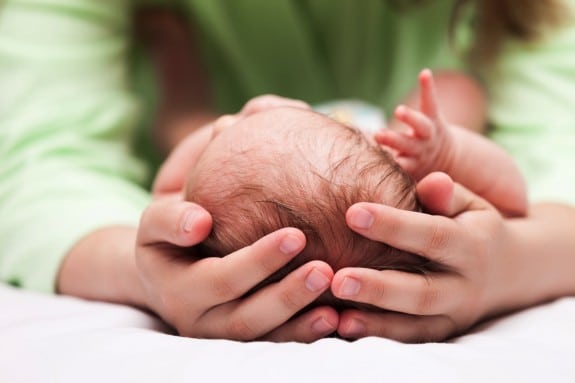When Carmen Meagu wanted to start her family, she had a lot of concerns. Her biggest was that any child she conceived would have the same rare form of muscular dystrophy as her and her father. Doctors confirmed that she had a 50 percent chance of that happening. For her, the risk seemed entirely too high.
“My dad had severe symptoms and it really got him down. He was unable to walk unaided and he always felt people were looking at him and staring. It had a massive impact on him mentally,” Carmen told The Telegraph. “I was told I could try and get pregnant and have a test at 16 weeks, but that really wasn’t an option for me because it would have been too hard to have an abortion at that stage.”
But then Carmen heard about a clinic in London that could screen out the disease with a special IVF technique. She felt she had to at least give it a try.
The technique, which compares gene sequences at 300 different points of the chromosome, works out which section of the genetic code may be defective. It can be used to test for conditions like Carmen’s Charcot-Marie-Tooth disease, but it can also screen for other conditions, such as Down Syndrome as well as certain genes that may cause miscarriage.
The procedure was successful, and the couple ended up delivering a perfectly healthy baby boy, who they named Lucas, back in December of last year. And they couldn’t be happier that they gave the procedure a try.
“Lucas is absolutely perfect. He is really big for his age, and healthy. I have peace of mind now that he is going to be okay. I obviously worry, like all mothers, but now I worry about normal things. I know for sure that he is not only free of Charcot-Marie-Tooth disease, but also other illnesses,” she said. “I would recommend it to any other mother who is worried about passing on an illness.”
In fact, she is so pleased with how the procedure went that she and her partner, Gabriel, have reserved two more embryos. They plan to have at least one more child within the next five years.
Now available on NHS, the procedure works pretty much like any other IVF procedure, but because most of the couples that would use the procedure are unlikely to have fertility problems, the success rate is higher.
“Essentially, karyomapping finds a fingerprint that is unique to the chromosome that carries the defective gene,” fertility expert, Paul Serhal, the founder of the Center of Reproductive and Genetic Health, told The Telegraph. “It is then possible to test the embryos produced using IVF for the presence of this fingerprint. Whenever this fingerprint is seen in an embryo, it means that it has inherited the chromosome carrying the defective gene.”
Related Articles:
- Indiana Couple Welcomes Identical Triplets!
- Premature Twins Born with Holes in Their Hearts Beat the Odds
- Father Raising Quadruplets Alone after Death of Wife







